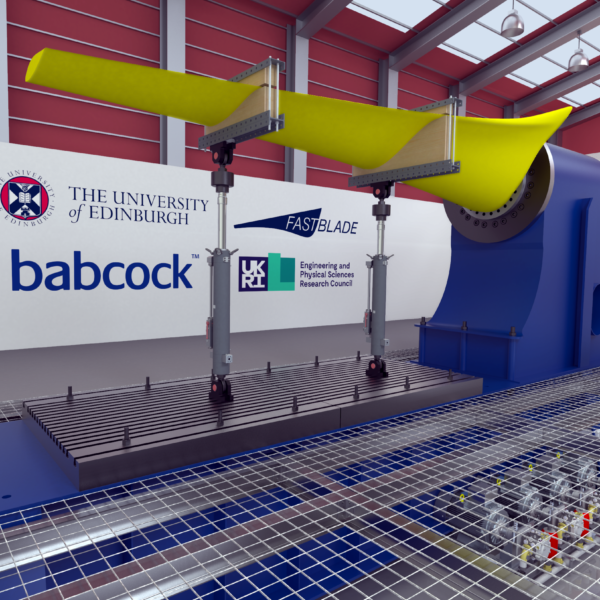29 يونيو 2020
Work to begin on £4.1m world-leading composite test centre FASTBLADE

The first major engineering works on FASTBLADE, a state-of-the-art composite structures research facility will begin in July as part of an industry-academic partnership between Babcock International Group (Babcock) and the University of Edinburgh.
A team of Babcock engineers will begin construction of FASTBLADE’s 75 tonne structural reaction frame early next month, and will begin fit out of the new facility, based at Babcock’s Rosyth site near Edinburgh.
It will initially be used for lifetime fatigue testing of renewable energy tidal turbine blades, using pioneering technology which will be the first of its kind in the world.
The facility is funded to a value of £4.1 million by the Engineering and Physical Sciences Research Council and the University of Edinburgh, with Babcock appointed as the principal engineering designer. With its novel technology it will be an international centre of innovation in the research and testing of composite materials and structures for a variety of industries such as tidal energy, marine, transport, nuclear and aerospace.
Cutting-edge digital and hydraulic technology systems developed by the university are more energy efficient than existing processes and will simulate real testing environments. Advanced analytics will assess structural performance in real time.
Engineers, working within COVID guidelines, will build and assemble the reaction frame which will span 16.2m long, 2.5m wide and 7.1m high and is expected to be complete by December.
The frame will withstand huge forces cycled millions of times over its lifespan as it tests composite structures and has been designed for future needs as structures such as tidal turbine blades become bigger and materials continue to develop.
The process will also create immediate benefits for product developers with savings on time and costs, reducing risk and improving safety.
The partnership with the University of Edinburgh is all about technology, innovation and investing in the next generation of engineers, explains Neil Young, a Technology Director at Babcock.
Neil said: “Babcock likes to work in innovative, collaborative ventures for long term value and this is a fantastic example of that. We’re bringing together the best engineering minds with technology innovation from Edinburgh.
“We have optimised the facility design in partnership with the university and the next step is the physical build of the facility which, when complete, will be a world-class centre of innovation in composite testing, as well as a fatigue test facility for developers.”
The development of the facility supports the digital skills agenda for both parties, and follows the University’s signing of the Edinburgh and South East Scotland City Region Deal in 2018, which aims to increase research-based collaboration and innovation between universities and industry across the region.
FASTBLADE strengthens the industrial academic partnership between Babcock and the University of Edinburgh and is part of wider innovation plans Babcock is co-ordinating across the region.
Professor Conchúr Ó Brádaigh, Head of the School of Engineering at the University of Edinburgh, said: “This collaboration is a real opportunity to develop the next generation of engineers that industry will need and will be a resource for apprentices and engineering students to capture real-time data from industrial-scale equipment in the classroom.
“This is a significant milestone towards this unique facility opening for business to the global composites manufacturing market. The reaction frame is the backbone of the FASTBLADE system, holding clients’ structures in place in order to carry out research and testing.”
FASTBLADE is expected to be fully operational in 2021.